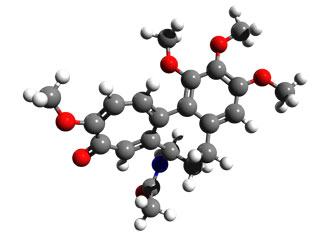Colchicine For Peyronie's Disease
In this article I cover the benefits, side effects and results from using Colchicine for Peyronie's treatment, but using Colchicine has shown some inconclusive results. It may be most effective during the early phase of the Peyronie's disease.
Colchicine side effects are fairly common and can be serious if the recommended Colchicine dosage is exceeded. You should never take Colchicine without consulting your doctor first.
What Is Colchicine?

Colchicine is an oral anti-inflammatory medicine that inhibits collagen secretion. It decreases collagen production by increasing the activity of collagenase, a naturally occurring enzyme that breaks down collagen.
FDA (US Food and Drug Administration) approved Colchicine in 2009 to treat acute gout and familial Mediterranean fever (FMF).
Colchicine has however been used to treat other diseases as well, including Peyronie's disease.
Colchicine As A Peyronie's Cure?
Simply put, Peyronie's is wound healing disorder, i.e. the healing process overcompensates, causing too much collagen to build up and form fibrous plaque (hard lump) in the penis.
Colchicine may work on Peyronie's as it decreases collagen production.
Colchicine for Peyronie's should always be prescribed by your doctor. Reputable Peyronie's specialists recommend using Colchicine for maximum 3 months and at the lowest possible dose.
Recommended Colchicine dosage for Peyronie's patients is 0.6 – 1.2 mg per day for 1 week and then increased to up to 2.4 mg per day for up to 3 months maximum.
What Are The Colchicine Benefits?
Colchicine has the convenience of a tablet and treatment should not take longer than 3 months.
What Are The Colchicine Side Effects?
Colchicine seems generally to be rather poorly tolerated and some notable Colchicine side effects have been reported.
Most common Colchicine side effects are gastrointestinal upset and diarrhea (in up to third of all patients).
More seriously, Colchicine can reduce the white blood cells count, damage bone marrow and lead to anemia (lower than normal number of red blood cells / not enough hemoglobin).
Most seriously, Colchicine can be toxic in high doses or if used for extended periods.
Is There Any Risk Involved
In Colchicine Treatment For Peyronie's Disease?
The Colchicine side effects can cause risk to your health. Colchicine poisoning has been compared to arsenic poisoning and in the worst cases can lead to multiple-system organ failure. There is no specific antidote for Colchicine but various treatments are available.
To reduce your risk of serious Colchicine side effects do not increase your Colchicine dosage or take it more frequently or for a longer period than instructed by your doctor.
In addition, several drugs (including Verapamil) affect the breakdown of Colchicine from the body. To avoid Colchicine side effects, the dose should be reduced if used in conjunction with any drugs that reduce the Colchicine elimination.
Always tell your doctor about all medication you are on, or have recently been on, before starting your Colchicine treatment.
The Results Of Using Colchicine For Peyronie's Disease
The evidence of Colchicine efficacy in reducing penis curvature, penile pain and plaque size are generally considered inconclusive.
However, some men with Peyronie's disease have reported positive results from using Colchicine for Peyronie's.
Colchicine may be more effective in treating Peyronie's in the early phase, i.e. when penis curvature is less than 30 degrees and there are no erectile dysfunction or blood flow problems.
Scientific Support
For Colchicine Treatment For Peyronie's Disease
There are some studies available on using Colchicine to treat Peyronie's disease and as often, the results are somewhat conflicting.
International Journal Of Impotence Research summarizes the main Peyronie's studies performed prior to 2002. They report some positive results of using Colchicine for Peyronie's, especially in the early phase of the disease. However, the journal points out the problems faced by those performing oral Peyronie's studies and concludes:
“The basis for oral therapy in Peyronie's disease has been founded in anecdotal, poorly designed retrospective studies” (International Journal Of Impotence Research)
Since then a randomized double blind, placebo controlled study has been published (2004) but its conclusion was discouraging:
“Colchicine is no better than placebo in improvement of pain, curvature angle, or plaque size in patients with Peyronie's disease” (Placebo Controlled Study - 2004)
My Personal Experience
And Opinion Of Using Colchicine For Peyronie's
I do not have personal experience of using Carnitine for treating Peyronie's disease.
I must admit that the inconclusive results and the notable Colchicine side effects are likely to have put me off from trying Colchicine for my Peyronie's disease. I would though ask my doctor's advice prior to making my mind up.
Have you used Colchicine in your fight against Peyronie's?
If so, please use the form below and leave your Comments, or relevant practical advice to other Peyronie's sufferers.






Leave your comment on this article